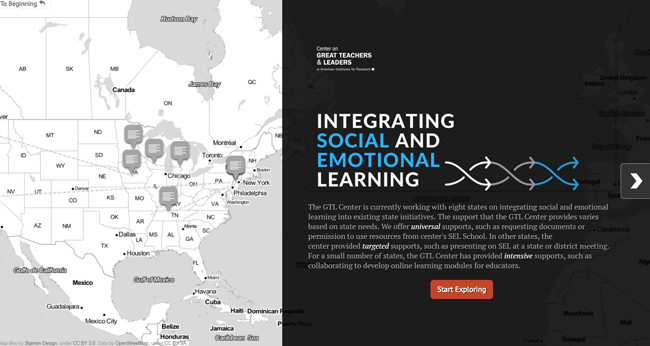Social and Emotional Learning
The GTL Center helps states, districts, schools, and educators introduce social and emotional learning (SEL) into the daily function of schools and classrooms. Our team works directly with states and their stakeholders to thoughtfully align and integrate SEL into existing state initiatives, such as educator evaluation and professional learning, school climate and culture, and school improvement efforts. This integrated approach reinforces the need to infuse social and emotional competency development across age spans and content, and it strengthens educators’ current efforts by establishing a more deliberate and explicit approach.
Partners and Approach
In partnership with the Appalachia Regional Comprehensive Center, the Great Lakes Comprehensive Center, and the Midwest Comprehensive Center, the GTL Center supported three inaugural states—Tennessee, Michigan, and Minnesota—in the development of SEL competencies, general and state-specific guidance, and online professional learning resources and tools to strengthen educator practice. Based on our work in these three states, we are now working in 10 states total.
Learn more about the GTL Center’s existing and emerging work by exploring the Story Map and State Profiles below.
State Profiles
The GTL Center Approach
To help states integrate SEL into existing policy and practice, the GTL Center offers multiple technical assistance supports, including the following:
- Cross-Office Collaboration. Facilitating cross-office meetings to identify current state policy and priority initiatives to align and fully integrate the social and emotional competencies across existing work.
- Stakeholder Engagement. Assisting states in developing competencies and materials using a broad, inclusive stakeholder-driven process, including the analysis and incorporation of stakeholder feedback.
- National Perspectives. Connecting state education agency staff to national experts, exemplars, and examples to accelerate development of state-specific social and emotional competencies and resources, including an analysis to determine the degree to which competencies and resources address cultural competence, human social and emotional development, and evidence-based practices.
-
Just-in-Time Collaboration. Providing thought-partnership, content development, and implementation resources through a networked community to:
- Support states as they develop their social and emotional (or social and personal) competencies by reviewing draft materials, co-facilitating state working groups, and sharing content expertise.
- Accelerate development of toolkits, guidance documents, and online professional learning modules to support implementation of SEL practices.
- Strengthen strategic communications planning to support feedback loops within stakeholder engagement, implementation, and scale-up.
- Advance the sustainability of implementation by supporting piloting and scale-up of efforts, such as supporting partnerships between the state education agency and districts to pilot SEL tools and professional learning resources, as well as supporting state efforts to create microcredentials for teachers.
Contacts




